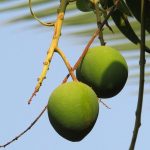**Introduction:**
African mango, also known as Irvingia gabonensis, is a fruit native to West and Central Africa. It has gained significant attention in recent years for its potential weight loss benefits. This blog post will delve into the science behind African mango and explore its effectiveness, safety, and side effects.
**Understanding African Mango:**
African mango is a large, yellow-orange fruit with a sweet and slightly tart flavor. It is rich in dietary fiber, essential vitamins, and minerals. The active ingredient responsible for its weight loss effects is a seed extract called IGOB131.
**Mechanism of Action:**
IGO131 works by inhibiting the production of leptin, a hormone that signals the brain to increase food intake. By reducing leptin levels, African mango helps curb appetite and promote a feeling of fullness. Additionally, it may help regulate blood sugar levels and improve insulin sensitivity, which can further support weight loss.
**Research Findings:**
Several clinical studies have investigated the weight loss effects of African mango. A 12-week study published in the Journal of Obesity found that participants who consumed 150 mg of IGOB131 daily lost an average of 12 pounds more than those who received a placebo. Another study published in the European Journal of Clinical Nutrition showed similar results, with participants losing an average of 9 pounds over 10 weeks.
**Safety and Side Effects:**
African mango is generally considered safe for most people. However, it is important to note that some individuals may experience side effects, such as gas, bloating, or nausea. These side effects are typically mild and resolve within a few days.
**Precautions:**
As with any supplement, it is essential to consult a healthcare professional before taking African mango. This is particularly important for individuals with underlying health conditions, pregnant women, or breastfeeding mothers.
**Dosage and Administration:**
The recommended dosage of African mango extract is typically between 150-300 mg daily. It is best taken with meals to minimize potential side effects.
**Conclusion:**
African mango appears to be a promising natural weight loss supplement supported by several clinical studies. Its ability to reduce appetite, regulate blood sugar, and improve insulin sensitivity may help promote weight loss and improve overall health. However, it is important to use it responsibly, consult a healthcare professional, and consider it as part of a balanced diet and exercise plan for optimal results.

